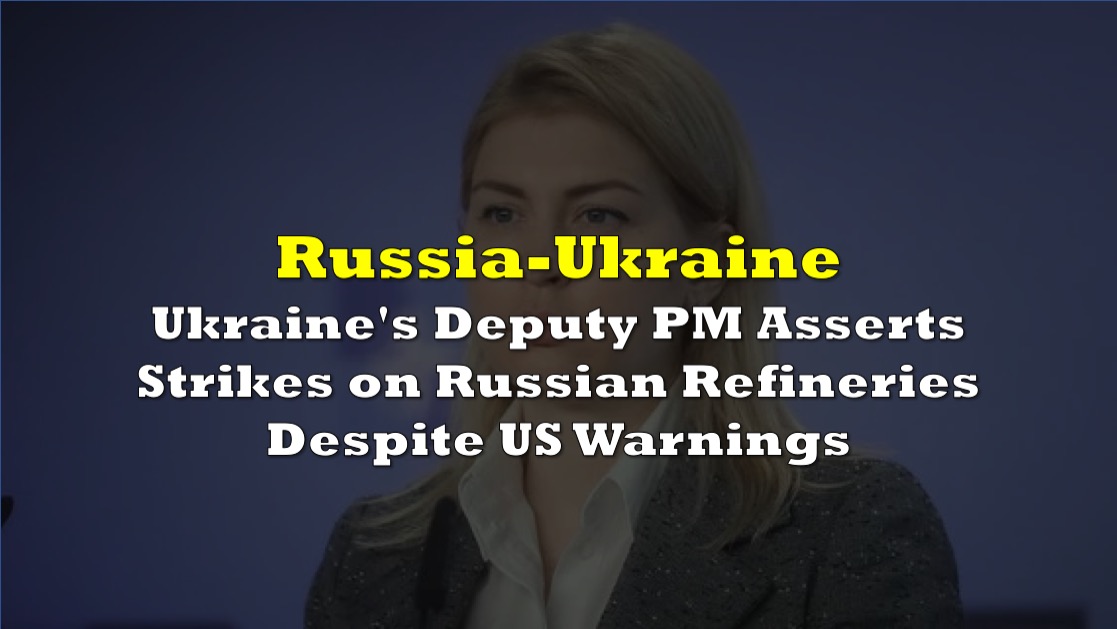Ukraine’s Deputy Prime Minister for European and Euro-Atlantic Integration Olga Stefanishina made a bold declaration at the “Kyiv Security Forum,” affirming that oil refineries within Russia’s borders are legitimate targets for Ukraine from a military standpoint. This statement, echoing amidst the ongoing conflict between Ukraine and Russia, underscores Ukraine’s strategic positioning and adherence to NATO standards.
Addressing inquiries about Ukraine’s reaction to US pleading to stop attacks on Russian oil refineries, Stefanishina articulated a resolute stance, stating in Ukrainian, “The Ukrainian side responded, I think, precisely by achieving its goals and by very successful operations conducted on the territory of the Russian Federation.”
In her direct speech, Stefanishina elucidated Ukraine’s military rationale, highlighting that these strikes align with NATO standards. She emphasized the necessity of leveraging available capabilities, resources, and practices to defend Ukrainian interests effectively. Reflecting on a prior interaction with NATO officials in February 2022, she emphasized her urging for UN intervention, suggesting the capability to “close the sky” over Ukraine—an indicative strategy against potential aerial threats.
Stefanishina’s exchange with NATO officials revealed a fundamental divergence in interpretation regarding NATO standards. While acknowledging the “appeals of our American partners,” she underscored Ukraine’s commitment to its defense strategies, mirroring NATO’s focus on disrupting infrastructure within Russia to safeguard Ukrainian territories from aerial assaults, including missile production facilities.
Furthermore, Stefanishina provided insights into Ukraine’s immediate needs amid escalating hostilities. Commenting on enemy attacks on March 22, she emphasized the imperative for international support, particularly in the provision of weaponry, stating, “Reaction is one thing, we expect weapons first and foremost.”
“We do not encourage or enable attacks inside of Russia”
Stefanishina’s remarks come in response to alleged calls from the United States to dissuade Ukraine from conducting strikes on Russian refineries. Citing concerns over potential repercussions, including global oil price hikes and retaliatory actions, the US administration has issued repeated warnings to Ukrainian officials.
According to sources familiar with the discussions, these warnings were conveyed directly to senior officials within Ukraine’s state security service and its military intelligence directorate. The Financial Times reports that both intelligence units have significantly expanded their drone programs since Russia’s full-scale invasion of Ukraine in February 2022.
The White House has reportedly expressed growing frustration over Ukrainian drone attacks targeting oil refineries, terminals, depots, and storage facilities in western Russia. These strikes have impacted Russia’s oil production capacity, contributing to a rise in global oil prices, which currently stand at $85 a barrel.
Despite facing Western sanctions, Russia remains a key player in global energy markets. Washington is particularly concerned that continued strikes on Russian facilities could prompt retaliatory measures, potentially disrupting energy infrastructure crucial to Western interests, such as the CPC pipeline.
The CPC pipeline transports oil from Kazakhstan through Russia to global markets. Western corporations such as ExxonMobil and Chevron rely on this pipeline, which Moscow temporarily closed in 2022.
“We do not encourage or enable attacks inside of Russia,” an National Security Council spokesperson said.
As Ukraine intensifies its air attacks and expands its drone capabilities, concerns grow over the impact on global energy markets and geopolitical stability. Notably, there have been at least 12 attacks on major Russian refineries since 2022, with recent weeks witnessing heightened drone activity targeting energy facilities.
The US objections coincide with Biden’s reelection campaign, with rising petrol prices posing a significant challenge. Analysts suggest that surging fuel costs during an election year present a major concern for sitting American presidents.
Ukraine’s drone strikes, characterized by advanced technologies and strategic planning, aim to disrupt Russian military operations and undermine Moscow’s war efforts. By targeting critical energy infrastructure and demonstrating the ability to penetrate Russian defenses, Ukraine seeks to garner international support and pressure Washington for crucial military assistance.
Information for this story was found via Financial Times, Pravda, and the sources mentioned. The author has no securities or affiliations related to the organizations discussed. Not a recommendation to buy or sell. Always do additional research and consult a professional before purchasing a security. The author holds no licenses.











